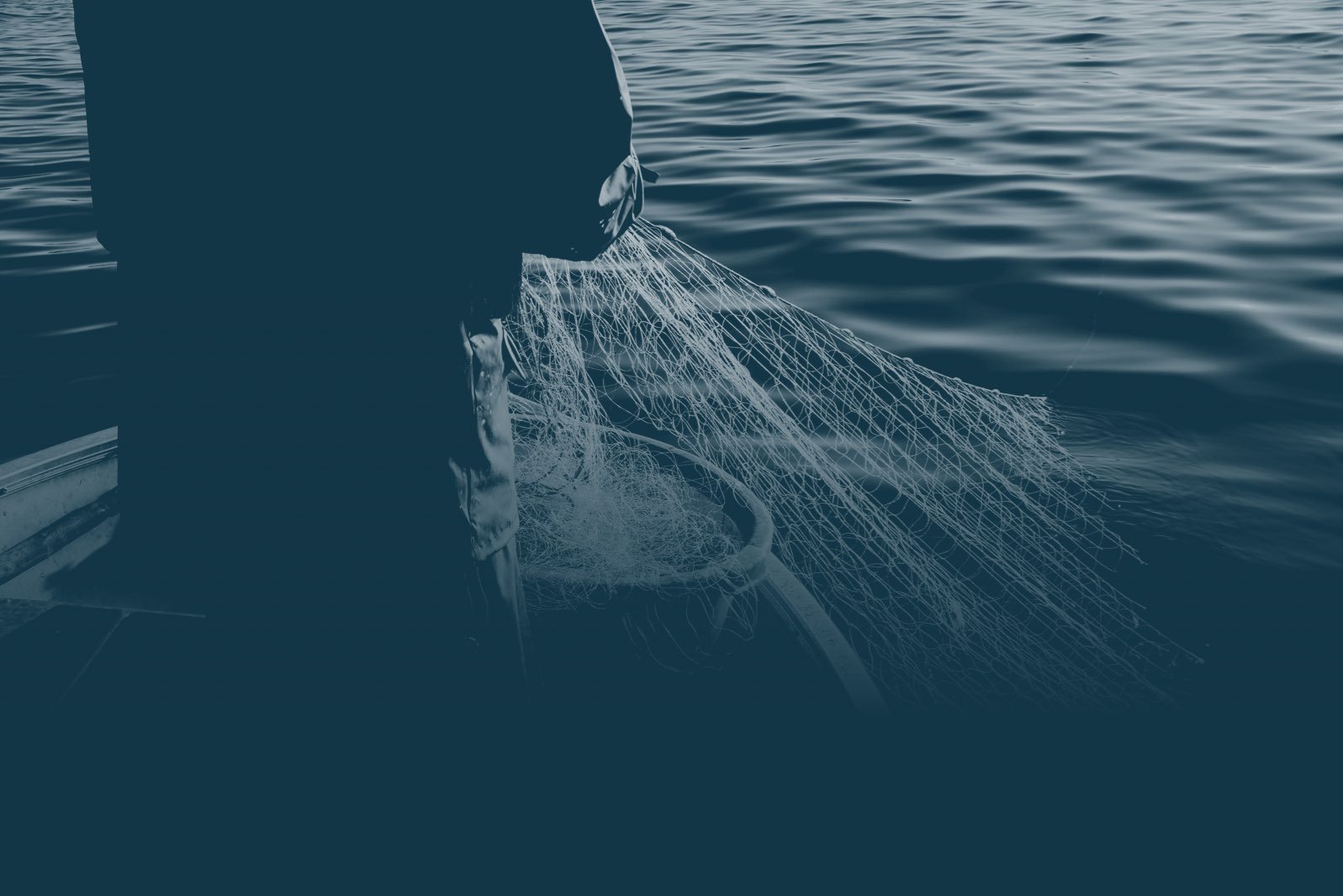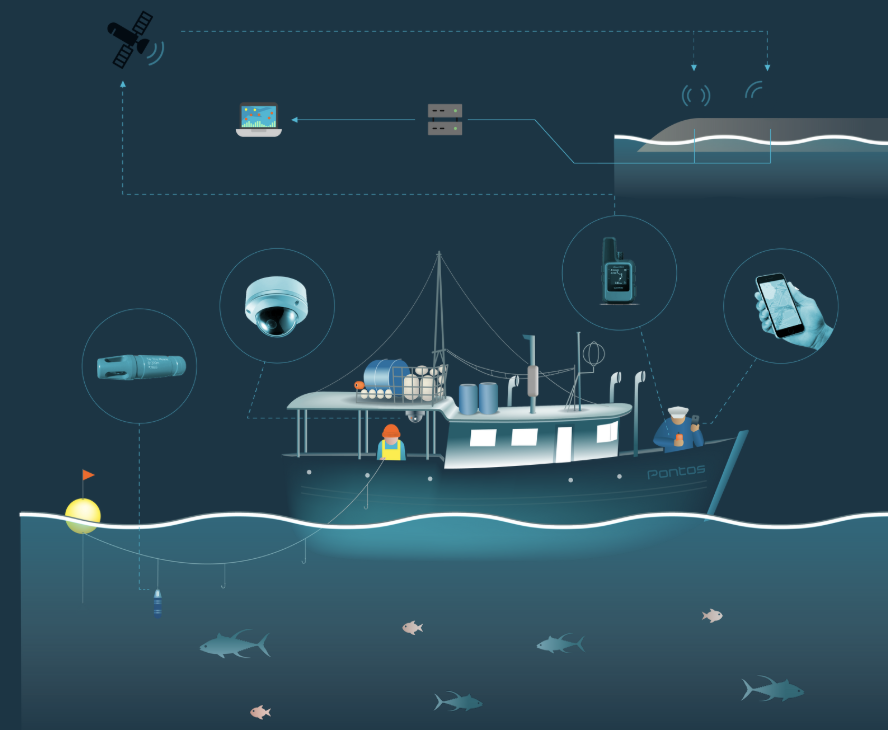
AI for fishing
PONTOS AI-Powered assistant, a valuable tool for Empowering all fishers to make informed, sustainable decisions.
Highlights
Fishing vessels account for 4% of global food CO₂ production (UN conference 2024) - decarbonization is essential. At the same time, Fuel costs represent 50-70% of operational expenses, making sustainability also a financial priority.
Regulations are tightening—adapt or fall Behind:
EU Taxonomy & Carbon Markets require traceable CO₂ reduction.
Retailers & financial markets are demanding ESG compliance.
New sustainability labels (MSC, ASC) favor low-carbon operators and traceability from ocean to market.
In order to face these challenges, PONTOS delivers AI Powered digital assistant to empower all fishers to make informed, sustainable decisions.
Do we need to redefine what sustainable fishing is ?
Pontos adheres to the principles of sustainable fishing but do you know what that means in practice ⁉️ Sustainable fishing is the application of sustainable development principles to fishing activities, structured around 4 key areas :
⚠️ Optimization of harvesting practices
This involves the use of methods to alleviate pressure on marine ecosystems. This approach aims to simultaneously limit overexploitation of stocks, accidental catches of non-target species, and geomorphological impacts linked to destructive techniques such as bottom trawling.
🚦 Ecosystem-based resource management
Bioeconomic models incorporate demographic parameters such as reproduction rates, population age structure to establish sustainable catch quotas. These limits, distributed among states through transnational agreements, incorporate adaptive mechanisms for shared stocks.
🚀 Innovation in Fisheries Governance
The development of scientific monitoring methods such as satellite tracking, genetic population analysis and certification models strengthens control over supply chains.
🩵 Consumer Involvement
Eco-labeling and blockchain traceability systems make it possible to assess the environmental impact of food choices, encouraging sustainability. This dimension is accompanied by educational campaigns on the production methods and population dynamics of commercial species.
This multidimensional approach aims to reconcile economic exploitation and the preservation of marine ecosystem services.
Pontos is committed to a sustainable approach, we are convinced that it is necessary to enable local fishing communities to increase their income and obtain fair recognition for their contribution to improve livelihoods and food and nutritional security.
At the same time, leading scientists redefine ‘sustainability’ to save the ocean and feed a hungry and warming planet ? They propose 11 golden rules to combat the current flawed fisheries management approach. The new framework envisions fishing that ensures abundant fish stocks while preserving ecosystems, mitigating climate change, guaranteeing food security, and respecting human rights. The vision Marine fisheries should minimise the ecological impact of every fish caught and maximise its societal benefit.
Collaboration and science are very important for a sustainable world
According to us, here is an overview of the 3 main sustainable practices implemented in different fisheries :
Scientific assessment because sustainable fisheries work closely with research institutes to regularly assess the status of stocks
Quotas and limitations put in place to preserve the resource, such as limited fishing season , maximum fishing quotas per season, minimum catch size, etc.
Low-impact fishing techniques such as selectivity of gear, limitation of impact on the seabed, having certifications and labels that attest to an internationally recognized guarantee of sustainability.
To fish sustainably around the world, it is crucial to adapt these principles to local contexts, relying on close collaboration between fishermen, scientists and management authorities.
Fishermen are the first ones to face the effects of climate change which has led to a decrease in catches and is also contributing to the modification of marine ecosystems.
With Artificial Intelligence, we can address a global environmental problem locally. The evolution of sustainable fishing could depend on the possibilities offered by artificial intelligence. Innovation is essential for :
✔️ strengthening food security by enabling fishermen to become the main actors of sustainable fishing
✔️ Allowing to achieve the Sustainable Development Goals set by the United Nations
✔️ Enabling retailers and consumers of fish and seafood to verify whether the products they sell and consume ⚓
The data collected will comply with sustainability principles, including for pelagic fishing in high seas. At Pontos, we strive to facilitate access to digital technologies for more professionals in the sector.
Pontos, a fruitful collaboration between engineers, scientists and worldwide fishing communities
At Pontos, we work actively with Inria a network of French scientists essential for the development of an AI. A great and promising tool for predicting future trends, it will be a real help for fishermen who will not only be able to connect to access their favorite fishing area but will actively participate in preserving them.
We have created a software with models that significantly improve traceability and analysis. Our models allow the combination of multiple sources of data essential for all stakeholders, from fishing captains to seafood producers.
Pontos collaborates with Inria via its Inria Startup Studio, thus benefiting from support in co-design, technology transfer and technical expertise. This allows us, among other things, to access advanced AI know-how and open source tools to accelerate our development.
We are working to develop a robust and verifiable AI system, integrating advanced methodologies to guarantee the reliability and interpretability of models to support sustainable fishing.
The need for resilience and transparency is real ! Fishing companies must prove the origin and impact of their catches up to the finished products to fit with regulatory obligations.














